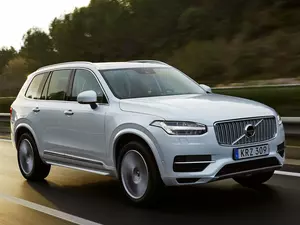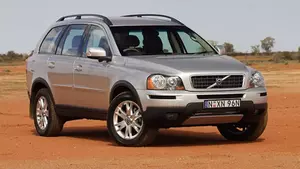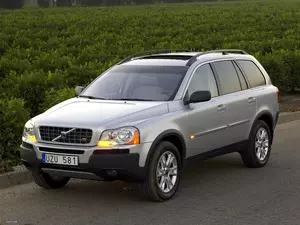


| Engine | 0—60 mph | 0—100 km/h | Top Speed | Averange Economy |
|---|---|---|---|---|
| 2.0 T8 TwEn | 5.5 s | 5.8 s | 143 mph | 102 mpg |
| 2.0 T5 | 7.5 s | 7.9 s | 134 mph | 30 mpg |
| 2.0 T6 | 6.2 s | 6.5 s | 143 mph | 29 mpg |
| 2.0 B5 | 7.2 s | 7.6 s | 137 mph | 41 mpg |
| Engine | 2.0 T8 TwEn |
|---|---|
| 0—60 mph | 5.5 s |
| 0—100 km/h | 5.8 s |
| Top Speed | 143 mph |
| Averange Economy | 102 mpg |
| Engine | 2.0 T5 |
| 0—60 mph | 7.5 s |
| 0—100 km/h | 7.9 s |
| Top Speed | 134 mph |
| Averange Economy | 30 mpg |
| Engine | 2.0 T6 |
| 0—60 mph | 6.2 s |
| 0—100 km/h | 6.5 s |
| Top Speed | 143 mph |
| Averange Economy | 29 mpg |
| Engine | 2.0 B5 |
| 0—60 mph | 7.2 s |
| 0—100 km/h | 7.6 s |
| Top Speed | 137 mph |
| Averange Economy | 41 mpg |
In 2020, Volvo XC90 0-60 acceleration was between 5.5 and 7.5 seconds.
Volvo XC90 0-60 mph was up to 42% faster in 2020 than world's average.
In 2020, Volvo XC90 0-60 mph to car weight ratio is shown below:
| Vehicle | Acceleration 0—60 mph (0—100 km/h) | Maximum speed | Acceleration to passenger ratio | Fuel consumption at high speed | Fuel type / gearbox |
|---|---|---|---|---|---|
| 2.0 T8 TwEn | 5.5 s to 60 mph (5.8 s to 100 km/h) | 143 mph (230 km/h) | 1.4 s to 60 mph / person | - | petrol / electricity / 8 |
| 2.0 T5 | 7.5 s to 60 mph (7.9 s to 100 km/h) | 134 mph (215 km/h) | 1.5 s to 60 mph / person | - | Petrol (Gasoline) / 8 |
| 2.0 T6 | 6.2 s to 60 mph (6.5 s to 100 km/h) | 143 mph (230 km/h) | 1.2 s to 60 mph / person | - | Petrol (Gasoline) / 8 |
| 2.0 B5 | 7.2 s to 60 mph (7.6 s to 100 km/h) | 137 mph (220 km/h) | 1.4 s to 60 mph / person | - | Diesel / 8 |
| Vehicle | 2.0 T8 TwEn |
|---|---|
| Acceleration 0-60 mph (0-100 km/h) | 5.5 s to 60 mph (5.8 s to 100 km/h) |
| Maximum speed | 143 mph (230 km/h) |
| Acceleration to passenger ratio | 1.4 s to 60 mph / person |
| Fuel consumption at high speed | - |
| Fuel type / gearbox | petrol / electricity / 8 |
| Vehicle | 2.0 T5 |
| Acceleration 0-60 mph (0-100 km/h) | 7.5 s to 60 mph (7.9 s to 100 km/h) |
| Maximum speed | 134 mph (215 km/h) |
| Acceleration to passenger ratio | 1.5 s to 60 mph / person |
| Fuel consumption at high speed | - |
| Fuel type / gearbox | Petrol (Gasoline) / 8 |
| Vehicle | 2.0 T6 |
| Acceleration 0-60 mph (0-100 km/h) | 6.2 s to 60 mph (6.5 s to 100 km/h) |
| Maximum speed | 143 mph (230 km/h) |
| Acceleration to passenger ratio | 1.2 s to 60 mph / person |
| Fuel consumption at high speed | - |
| Fuel type / gearbox | Petrol (Gasoline) / 8 |
| Vehicle | 2.0 B5 |
| Acceleration 0-60 mph (0-100 km/h) | 7.2 s to 60 mph (7.6 s to 100 km/h) |
| Maximum speed | 137 mph (220 km/h) |
| Acceleration to passenger ratio | 1.4 s to 60 mph / person |
| Fuel consumption at high speed | - |
| Fuel type / gearbox | Diesel / 8 |

| Engine | 0—60 mph | 0—100 km/h | Top Speed | Averange Economy |
|---|---|---|---|---|
| 2.0 D5 | 7.4 s | 7.8 s | 137 mph | 41 mpg |
| 2.0 T6 | 6.2 s | 6.5 s | 143 mph | 29 mpg |
| 2.0 T8 | 5.5 s | 5.8 s | 143 mph | 94 mpg |
| 2.0 T5 | 7.5 s | 7.9 s | 134 mph | 30 mpg |
| 2.0 D4 | 8.9 s | 9.4 s | 124 mph | 41 mpg |
| Engine | 2.0 D5 |
|---|---|
| 0—60 mph | 7.4 s |
| 0—100 km/h | 7.8 s |
| Top Speed | 137 mph |
| Averange Economy | 41 mpg |
| Engine | 2.0 T6 |
| 0—60 mph | 6.2 s |
| 0—100 km/h | 6.5 s |
| Top Speed | 143 mph |
| Averange Economy | 29 mpg |
| Engine | 2.0 T8 |
| 0—60 mph | 5.5 s |
| 0—100 km/h | 5.8 s |
| Top Speed | 143 mph |
| Averange Economy | 94 mpg |
| Engine | 2.0 T5 |
| 0—60 mph | 7.5 s |
| 0—100 km/h | 7.9 s |
| Top Speed | 134 mph |
| Averange Economy | 30 mpg |
| Engine | 2.0 D4 |
| 0—60 mph | 8.9 s |
| 0—100 km/h | 9.4 s |
| Top Speed | 124 mph |
| Averange Economy | 41 mpg |
In 2015, Volvo XC90 0-60 acceleration was between 5.5 and 8.9 seconds.
Volvo XC90 0-60 mph was up to 42% faster in 2015 than world's average.
In 2015, Volvo XC90 0-60 mph to car weight ratio is shown below:
| Vehicle | Acceleration 0—60 mph (0—100 km/h) | Maximum speed | Acceleration to passenger ratio | Fuel consumption at high speed | Fuel type / gearbox |
|---|---|---|---|---|---|
| 2.0 D5 | 7.4 s to 60 mph (7.8 s to 100 km/h) | 137 mph (220 km/h) | 1.5 s to 60 mph / person | - | Diesel / 8 |
| 2.0 T6 | 6.2 s to 60 mph (6.5 s to 100 km/h) | 143 mph (230 km/h) | 1.2 s to 60 mph / person | 35 mpg (6.8 L per 100 km) | Petrol (Gasoline) / 8 |
| 2.0 T8 | 5.5 s to 60 mph (5.8 s to 100 km/h) | 143 mph (230 km/h) | 1.4 s to 60 mph / person | - | Petrol (Gasoline) / 8 |
| 2.0 T5 | 7.5 s to 60 mph (7.9 s to 100 km/h) | 134 mph (215 km/h) | 1.5 s to 60 mph / person | 34 mpg (7 L per 100 km) | Petrol (Gasoline) / 8 |
| 2.0 D4 | 8.9 s to 60 mph (9.4 s to 100 km/h) | 124 mph (200 km/h) | 1.8 s to 60 mph / person | - | Diesel / 8 |
| Vehicle | 2.0 D5 |
|---|---|
| Acceleration 0-60 mph (0-100 km/h) | 7.4 s to 60 mph (7.8 s to 100 km/h) |
| Maximum speed | 137 mph (220 km/h) |
| Acceleration to passenger ratio | 1.5 s to 60 mph / person |
| Fuel consumption at high speed | - |
| Fuel type / gearbox | Diesel / 8 |
| Vehicle | 2.0 T6 |
| Acceleration 0-60 mph (0-100 km/h) | 6.2 s to 60 mph (6.5 s to 100 km/h) |
| Maximum speed | 143 mph (230 km/h) |
| Acceleration to passenger ratio | 1.2 s to 60 mph / person |
| Fuel consumption at high speed | 35 mpg (6.8 L per 100 km) |
| Fuel type / gearbox | Petrol (Gasoline) / 8 |
| Vehicle | 2.0 T8 |
| Acceleration 0-60 mph (0-100 km/h) | 5.5 s to 60 mph (5.8 s to 100 km/h) |
| Maximum speed | 143 mph (230 km/h) |
| Acceleration to passenger ratio | 1.4 s to 60 mph / person |
| Fuel consumption at high speed | - |
| Fuel type / gearbox | Petrol (Gasoline) / 8 |
| Vehicle | 2.0 T5 |
| Acceleration 0-60 mph (0-100 km/h) | 7.5 s to 60 mph (7.9 s to 100 km/h) |
| Maximum speed | 134 mph (215 km/h) |
| Acceleration to passenger ratio | 1.5 s to 60 mph / person |
| Fuel consumption at high speed | 34 mpg (7 L per 100 km) |
| Fuel type / gearbox | Petrol (Gasoline) / 8 |
| Vehicle | 2.0 D4 |
| Acceleration 0-60 mph (0-100 km/h) | 8.9 s to 60 mph (9.4 s to 100 km/h) |
| Maximum speed | 124 mph (200 km/h) |
| Acceleration to passenger ratio | 1.8 s to 60 mph / person |
| Fuel consumption at high speed | - |
| Fuel type / gearbox | Diesel / 8 |

| Engine | 0—60 mph | 0—100 km/h | Top Speed | Averange Economy |
|---|---|---|---|---|
| 2.4 D3 | 11.2 s | 11.8 s | 118 mph | 29 mpg |
| 2.4 D5 | 9.8 s | 10.3 s | 127 mph | 29 mpg |
| 4.4 V8 | 6.9 s | 7.3 s | 130 mph | 18 mpg |
| 3.2 | 9 s | 9.5 s | 130 mph | 21 mpg |
| 2.4d | 10.9 s | 11.5 s | 118 mph | 26 mpg |
| 2.5i | 9.4 s | 9.9 s | 124 mph | 21 mpg |
| 3.2i | 8.8 s | 9.3 s | 118 mph | 20 mpg |
| 4.4i | 6.9 s | 7.3 s | 130 mph | 18 mpg |
| 2.4 D4 | 11.2 s | 11.8 s | 0 mph | 29 mpg |
| Engine | 2.4 D3 |
|---|---|
| 0—60 mph | 11.2 s |
| 0—100 km/h | 11.8 s |
| Top Speed | 118 mph |
| Averange Economy | 29 mpg |
| Engine | 2.4 D5 |
| 0—60 mph | 9.8 s |
| 0—100 km/h | 10.3 s |
| Top Speed | 127 mph |
| Averange Economy | 29 mpg |
| Engine | 4.4 V8 |
| 0—60 mph | 6.9 s |
| 0—100 km/h | 7.3 s |
| Top Speed | 130 mph |
| Averange Economy | 18 mpg |
| Engine | 3.2 |
| 0—60 mph | 9 s |
| 0—100 km/h | 9.5 s |
| Top Speed | 130 mph |
| Averange Economy | 21 mpg |
| Engine | 2.4d |
| 0—60 mph | 10.9 s |
| 0—100 km/h | 11.5 s |
| Top Speed | 118 mph |
| Averange Economy | 26 mpg |
| Engine | 2.5i |
| 0—60 mph | 9.4 s |
| 0—100 km/h | 9.9 s |
| Top Speed | 124 mph |
| Averange Economy | 21 mpg |
| Engine | 3.2i |
| 0—60 mph | 8.8 s |
| 0—100 km/h | 9.3 s |
| Top Speed | 118 mph |
| Averange Economy | 20 mpg |
| Engine | 4.4i |
| 0—60 mph | 6.9 s |
| 0—100 km/h | 7.3 s |
| Top Speed | 130 mph |
| Averange Economy | 18 mpg |
| Engine | 2.4 D4 |
| 0—60 mph | 11.2 s |
| 0—100 km/h | 11.8 s |
| Top Speed | 0 mph |
| Averange Economy | 29 mpg |
In 2007, Volvo XC90 0-60 acceleration was between 6.9 and 11.2 seconds.
Volvo XC90 0-60 mph was up to 18% slower in 2007 than world's average.
In 2007, Volvo XC90 0-60 mph to car weight ratio is shown below:
| Vehicle | Acceleration 0—60 mph (0—100 km/h) | Maximum speed | Acceleration to passenger ratio | Fuel consumption at high speed | Fuel type / gearbox |
|---|---|---|---|---|---|
| 2.4 D3 | 11.2 s to 60 mph (11.8 s to 100 km/h) | 118 mph (190 km/h) | 2.2 s to 60 mph / person | - | Diesel / 6 |
| 2.4 D5 | 9.8 s to 60 mph (10.3 s to 100 km/h) | 127 mph (205 km/h) | 2 s to 60 mph / person | 35 mpg (6.8 L per 100 km) | Diesel / 6 |
| 4.4 V8 | 6.9 s to 60 mph (7.3 s to 100 km/h) | 130 mph (210 km/h) | 1.4 s to 60 mph / person | - | Petrol (Gasoline) / 6 |
| 3.2 | 9 s to 60 mph (9.5 s to 100 km/h) | 130 mph (210 km/h) | 1.8 s to 60 mph / person | - | Petrol (Gasoline) / 6 |
| 2.4d | 10.9 s to 60 mph (11.5 s to 100 km/h) | 118 mph (190 km/h) | 1.6 s to 60 mph / person | 32 mpg (7.4 L per 100 km) | Diesel / 6 |
| 2.5i | 9.4 s to 60 mph (9.9 s to 100 km/h) | 124 mph (200 km/h) | 1.3 s to 60 mph / person | 27 mpg (8.8 L per 100 km) | Petrol (Gasoline) |
| 3.2i | 8.8 s to 60 mph (9.3 s to 100 km/h) | 118 mph (190 km/h) | 1.3 s to 60 mph / person | - | Petrol (Gasoline) / 6 |
| 4.4i | 6.9 s to 60 mph (7.3 s to 100 km/h) | 130 mph (210 km/h) | 1 s to 60 mph / person | 25 mpg (9.6 L per 100 km) | Petrol (Gasoline) / 6 |
| 2.4 D4 | 11.2 s to 60 mph (11.8 s to 100 km/h) | 0 mph (0 km/h) | 2.2 s to 60 mph / person | 35 mpg (6.7 L per 100 km) | Diesel / 6 |
| Vehicle | 2.4 D3 |
|---|---|
| Acceleration 0-60 mph (0-100 km/h) | 11.2 s to 60 mph (11.8 s to 100 km/h) |
| Maximum speed | 118 mph (190 km/h) |
| Acceleration to passenger ratio | 2.2 s to 60 mph / person |
| Fuel consumption at high speed | - |
| Fuel type / gearbox | Diesel / 6 |
| Vehicle | 2.4 D5 |
| Acceleration 0-60 mph (0-100 km/h) | 9.8 s to 60 mph (10.3 s to 100 km/h) |
| Maximum speed | 127 mph (205 km/h) |
| Acceleration to passenger ratio | 2 s to 60 mph / person |
| Fuel consumption at high speed | 35 mpg (6.8 L per 100 km) |
| Fuel type / gearbox | Diesel / 6 |
| Vehicle | 4.4 V8 |
| Acceleration 0-60 mph (0-100 km/h) | 6.9 s to 60 mph (7.3 s to 100 km/h) |
| Maximum speed | 130 mph (210 km/h) |
| Acceleration to passenger ratio | 1.4 s to 60 mph / person |
| Fuel consumption at high speed | - |
| Fuel type / gearbox | Petrol (Gasoline) / 6 |
| Vehicle | 3.2 |
| Acceleration 0-60 mph (0-100 km/h) | 9 s to 60 mph (9.5 s to 100 km/h) |
| Maximum speed | 130 mph (210 km/h) |
| Acceleration to passenger ratio | 1.8 s to 60 mph / person |
| Fuel consumption at high speed | - |
| Fuel type / gearbox | Petrol (Gasoline) / 6 |
| Vehicle | 2.4d |
| Acceleration 0-60 mph (0-100 km/h) | 10.9 s to 60 mph (11.5 s to 100 km/h) |
| Maximum speed | 118 mph (190 km/h) |
| Acceleration to passenger ratio | 1.6 s to 60 mph / person |
| Fuel consumption at high speed | 32 mpg (7.4 L per 100 km) |
| Fuel type / gearbox | Diesel / 6 |
| Vehicle | 2.5i |
| Acceleration 0-60 mph (0-100 km/h) | 9.4 s to 60 mph (9.9 s to 100 km/h) |
| Maximum speed | 124 mph (200 km/h) |
| Acceleration to passenger ratio | 1.3 s to 60 mph / person |
| Fuel consumption at high speed | 27 mpg (8.8 L per 100 km) |
| Fuel type / gearbox | Petrol (Gasoline) |
| Vehicle | 3.2i |
| Acceleration 0-60 mph (0-100 km/h) | 8.8 s to 60 mph (9.3 s to 100 km/h) |
| Maximum speed | 118 mph (190 km/h) |
| Acceleration to passenger ratio | 1.3 s to 60 mph / person |
| Fuel consumption at high speed | - |
| Fuel type / gearbox | Petrol (Gasoline) / 6 |
| Vehicle | 4.4i |
| Acceleration 0-60 mph (0-100 km/h) | 6.9 s to 60 mph (7.3 s to 100 km/h) |
| Maximum speed | 130 mph (210 km/h) |
| Acceleration to passenger ratio | 1 s to 60 mph / person |
| Fuel consumption at high speed | 25 mpg (9.6 L per 100 km) |
| Fuel type / gearbox | Petrol (Gasoline) / 6 |
| Vehicle | 2.4 D4 |
| Acceleration 0-60 mph (0-100 km/h) | 11.2 s to 60 mph (11.8 s to 100 km/h) |
| Maximum speed | 0 mph (0 km/h) |
| Acceleration to passenger ratio | 2.2 s to 60 mph / person |
| Fuel consumption at high speed | 35 mpg (6.7 L per 100 km) |
| Fuel type / gearbox | Diesel / 6 |

| Engine | 0—60 mph | 0—100 km/h | Top Speed | Averange Economy |
|---|---|---|---|---|
| 2.4 TDi | 11.7 s | 12.3 s | 115 mph | - |
| 2.4 D3 | 11.2 s | 11.8 s | 0 mph | 29 mpg |
| 3.2 | 9 s | 9.5 s | 0 mph | 20 mpg |
| 2.5 20V | 9.4 s | 9.9 s | 130 mph | - |
| 2.9 T6 | 8.8 s | 9.3 s | 130 mph | - |
| 2.8 24V | 8.8 s | 9.3 s | 130 mph | - |
| Engine | 2.4 TDi |
|---|---|
| 0—60 mph | 11.7 s |
| 0—100 km/h | 12.3 s |
| Top Speed | 115 mph |
| Averange Economy | - |
| Engine | 2.4 D3 |
| 0—60 mph | 11.2 s |
| 0—100 km/h | 11.8 s |
| Top Speed | 0 mph |
| Averange Economy | 29 mpg |
| Engine | 3.2 |
| 0—60 mph | 9 s |
| 0—100 km/h | 9.5 s |
| Top Speed | 0 mph |
| Averange Economy | 20 mpg |
| Engine | 2.5 20V |
| 0—60 mph | 9.4 s |
| 0—100 km/h | 9.9 s |
| Top Speed | 130 mph |
| Averange Economy | - |
| Engine | 2.9 T6 |
| 0—60 mph | 8.8 s |
| 0—100 km/h | 9.3 s |
| Top Speed | 130 mph |
| Averange Economy | - |
| Engine | 2.8 24V |
| 0—60 mph | 8.8 s |
| 0—100 km/h | 9.3 s |
| Top Speed | 130 mph |
| Averange Economy | - |
In 2003, Volvo XC90 0-60 acceleration was between 8.8 and 11.7 seconds.
Volvo XC90 0-60 mph was up to 23% slower in 2003 than world's average.
In 2003, Volvo XC90 0-60 mph to car weight ratio is shown below:
| Vehicle | Acceleration 0—60 mph (0—100 km/h) | Maximum speed | Acceleration to passenger ratio | Fuel consumption at high speed | Fuel type / gearbox |
|---|---|---|---|---|---|
| 2.4 TDi | 11.7 s to 60 mph (12.3 s to 100 km/h) | 115 mph (185 km/h) | 2.3 s to 60 mph / person | 31 mpg (7.5 L per 100 km) | Diesel / 5 |
| 2.4 D3 | 11.2 s to 60 mph (11.8 s to 100 km/h) | 0 mph (0 km/h) | 2.2 s to 60 mph / person | 35 mpg (6.8 L per 100 km) | Diesel / 6 |
| 3.2 | 9 s to 60 mph (9.5 s to 100 km/h) | 0 mph (0 km/h) | 1.8 s to 60 mph / person | 26 mpg (8.9 L per 100 km) | Petrol (Gasoline) / 6 |
| 2.5 20V | 9.4 s to 60 mph (9.9 s to 100 km/h) | 130 mph (210 km/h) | 1.9 s to 60 mph / person | 25 mpg (9.5 L per 100 km) | Petrol (Gasoline) / 5 |
| 2.9 T6 | 8.8 s to 60 mph (9.3 s to 100 km/h) | 130 mph (210 km/h) | 1.8 s to 60 mph / person | 25 mpg (9.6 L per 100 km) | Petrol (Gasoline) / 4 |
| 2.8 24V | 8.8 s to 60 mph (9.3 s to 100 km/h) | 130 mph (210 km/h) | 1.8 s to 60 mph / person | 25 mpg (9.6 L per 100 km) | Petrol (Gasoline) / 4 |
| Vehicle | 2.4 TDi |
|---|---|
| Acceleration 0-60 mph (0-100 km/h) | 11.7 s to 60 mph (12.3 s to 100 km/h) |
| Maximum speed | 115 mph (185 km/h) |
| Acceleration to passenger ratio | 2.3 s to 60 mph / person |
| Fuel consumption at high speed | 31 mpg (7.5 L per 100 km) |
| Fuel type / gearbox | Diesel / 5 |
| Vehicle | 2.4 D3 |
| Acceleration 0-60 mph (0-100 km/h) | 11.2 s to 60 mph (11.8 s to 100 km/h) |
| Maximum speed | 0 mph (0 km/h) |
| Acceleration to passenger ratio | 2.2 s to 60 mph / person |
| Fuel consumption at high speed | 35 mpg (6.8 L per 100 km) |
| Fuel type / gearbox | Diesel / 6 |
| Vehicle | 3.2 |
| Acceleration 0-60 mph (0-100 km/h) | 9 s to 60 mph (9.5 s to 100 km/h) |
| Maximum speed | 0 mph (0 km/h) |
| Acceleration to passenger ratio | 1.8 s to 60 mph / person |
| Fuel consumption at high speed | 26 mpg (8.9 L per 100 km) |
| Fuel type / gearbox | Petrol (Gasoline) / 6 |
| Vehicle | 2.5 20V |
| Acceleration 0-60 mph (0-100 km/h) | 9.4 s to 60 mph (9.9 s to 100 km/h) |
| Maximum speed | 130 mph (210 km/h) |
| Acceleration to passenger ratio | 1.9 s to 60 mph / person |
| Fuel consumption at high speed | 25 mpg (9.5 L per 100 km) |
| Fuel type / gearbox | Petrol (Gasoline) / 5 |
| Vehicle | 2.9 T6 |
| Acceleration 0-60 mph (0-100 km/h) | 8.8 s to 60 mph (9.3 s to 100 km/h) |
| Maximum speed | 130 mph (210 km/h) |
| Acceleration to passenger ratio | 1.8 s to 60 mph / person |
| Fuel consumption at high speed | 25 mpg (9.6 L per 100 km) |
| Fuel type / gearbox | Petrol (Gasoline) / 4 |
| Vehicle | 2.8 24V |
| Acceleration 0-60 mph (0-100 km/h) | 8.8 s to 60 mph (9.3 s to 100 km/h) |
| Maximum speed | 130 mph (210 km/h) |
| Acceleration to passenger ratio | 1.8 s to 60 mph / person |
| Fuel consumption at high speed | 25 mpg (9.6 L per 100 km) |
| Fuel type / gearbox | Petrol (Gasoline) / 4 |